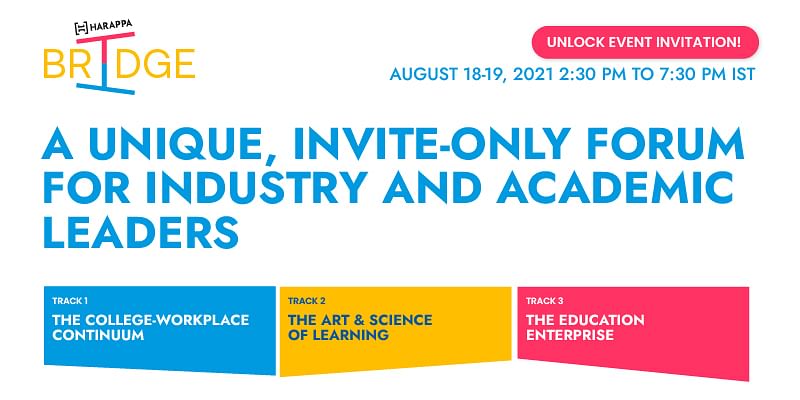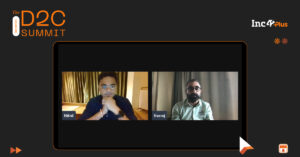In his decades-long experience in academics, Pramath Raj Sinha often observed how many students don’t learn the life skills that are critical to success.
“I believe that a lot of what we are teaching our children is not what actually makes one successful in life,” says Pramath, who is a part of the founding team and a trustee at Ashoka University. He has also served as the founding Dean of India School of Business in 2002.
Pramath’s observations resonated with Shreyasi Singh, who’d worked with him in the Vedica Scholars Programme for Women in 2015.
Given their belief that learning new things never hurt anyone, the two saw the need for a platform that could help professionals add a new dimension to their skills with critical life and behavioural skills and launched Harappa in 2018.
While serving as the editor for the Indian edition of Inc., Shreyasi had seen technology lead many businesses on the road to success. So, leveraging technology to achieve a purpose she was so passionate about was a no-brainer.
Today, Harappa is helping hundreds of professionals explore new avenues of personal growth with the tailored e-learning courses that build their cognitive and social skills and add to their employability.
“It is imperative for the youth to equip themselves with foundational skills such as problem-solving and effective communication to achieve professional success and personal growth. It is these skills that make a difference between a good and an outstanding employee, or between being a follower and a leader,” says Shreyasi Singh, Founder and CEO of Harappa.
Exploring the other side of education
When the two founders were contemplating a brand name for their New Delhi-based startup, they brainstormed over some 50+ options before deciding on ‘Harappa’. As proud Biharis, lovers of Hindi, and enthusiasts of Indian textiles, art, music and food, they were always drawn to names and imagery that represented India’s rich cultural heritage.
“Like the ancient civilisation of Harappa, we believe we are pioneering a new frontier of excellence. We felt that our curriculum of cognitive, social and emotional skills shared its texture with the grounded and foundational imagery of the Harappan sites. Our skills are foundational to an individual’s life and growth,” explains Shreyasi.
She adds that education in India is generally fragmented. “We are both learning junkies and our focus was to upskill people. We cared deeply about life and behaviour skills which are imperative for our own professional success,” says Shreyasi.
Agreeing with her, Pramath Raj Sinha, Founder and Chairman, Harappa says, “At Harappa, we are trying to teach things that schools and colleges do not really teach. We call these skills ‘Thrive Skills”.
Thrive Skills: For enterprises, institutions and individuals
Harappa operates on three business models. The first is based on tie-ups with college campuses, helping students to be workplace ready and teaches them how to communicate effectively, and prepares faculty to keep pace with changing classroom demands. In the second model, the team works with both big and small scale enterprises across industries to help their employees upskill. Under its third model, Harappa caters directly to individual learners, where its target audience ranges from 18-45 year olds.
Harappa’s programs drive transformative career success using Thrive Skills—an essential set of cognitive, social, and behavioural skills to enable individuals to continuously succeed at every stage of their career.
For leadership success, Harappa offers three sharply-targeted flagship programmes: High Performing Leaders Program, Powerful Presence Program and Women’s Leadership Program. Each of these programmes is mapped to more than 15 top Thrive Skills such as audience connect, practising mindfulness, client centricity, brand building, powerful storytelling and big picture thinking, among many others.
Know more about Thrive Skills here.
Scaling with a distinguished set of faculty
Today, the EdTech battleground is heating up, but Harappa’s biggest differentiator is its faculty. Their 80+ faculty deliver rich and contextualised content that is tailored to suit the requirements of 21st-century learners.
“For each of our existing 27 courses, we have five or more faculty members, who are a good mix of practicing senior professionals and academicians. For learners to really understand how to make use of what we are teaching them, they have to learn it from people who have applied this in their everyday life,” explains Shreyasi.
Pramath adds that while other platforms offer a large number of courses on various topics, Harappa focuses on its special niche. “You might find a course on public speaking or critical thinking on other platforms, but they are an add on. We focus on an important aspect of learning and skills and focus only on that to ensure that we do an outstanding job,” he says.
Harappa Bridge: Reimagining work and education
The founders say that their vision is to be the world’s largest online learning institution offering Thrive Skills focused programs for career success. To that end, Harappa continues to catalyse meaningful conversations around education and employment in India, most recently through Bridge, a two-day exclusive, invite-only event on August 18-19, 2021 that will bring together 45+ stellar speakers and 1,000+ talent leaders and academics in the audience.
From the perceived importance and impact of resumes to figuring out who’s to blame for the rising number of unemployable graduates and the future of education, the audience can look forward to insightful discussions that will address academia-industry integration. Know more and request an invite.
Demonstrating resilience amidst the pandemic
The COVID-19 pandemic brought a new focus to online education and Harappa saw a growing interest in their online courses and programmes, podcasts, and webinars, among other digital offerings.
To cater to the increased demand for live masterclasses and webinars, Harappa roped in faculty from international educational institutions. Before the pandemic, these faculty were only involved in preparing the curriculum of Harappa’s courses, but now they were also engaged in teaching.
The pandemic also saw Harappa launching ‘Tenacity’, a month-long free initiative that equips people with tools, frameworks, and reassuring advice from experts to be resilient during this unprecedented crisis.
The company also offered free access to its Embracing Change course starting March 2020. The course has powerful frameworks and concepts to help people navigate setbacks and make the right choices. So far, more than 3,00,000 learners have signed up for the course and it has achieved an overall course feedback rating of 4.6/5.
To add another feather to its cap, Harappa also raised an undisclosed funding amount from James Murdoch-led Lupa Systems in 2020.
“The new normal is going to require everyone to inculcate different skills and practise new behaviours. We all will have to adopt a positive mindset and be able to navigate through these tough times. ‘Change’ will be a big skill that each one of us is going to need and I think that our courses can help,” says Shreyasi.
On the road to add 5 million learners to the Harappa family
Today, Harappa caters to nearly 120 institutions and enterprise partners, and nearly four lakh learners have enrolled on its platform.
“By FY23, we aim to target 3,70,000+ paid learners and reach a milestone figure of 5 million users. All of our business models need to stabilise and grow. There is an opportunity to reach out to Harappa Kids, go beyond English to other regional languages and of course to go overseas,” says Pramath.










